Getting To Know: Temple University (PA)-Again
I last visited Temple University in late 2019, just before the pandemic hit us. I recently went back to Temple to take a tour of the College of Engineering at the invitation of their enrollment management team. Check out my updated Temple University Pinterest page, so you can see more of the campus.
The College of Engineering might be one of Temple’s hidden gems.
With 1,400 undergraduates, it has a small student body within a large university. It even has fewer undergraduates than Drexel’s engineering school, and Drexel has about half as many students across their whole university. Temple’s engineering enrollment is 25 percent female and the 44 percent men and women of color. I had previously met with Temple Engineering students when they exhibited a competitive race car at the Philadelphia Auto Show and enjoyed my conversations with them. I dropped a photo of their workspace as well as two other workspaces in the engineering complex.
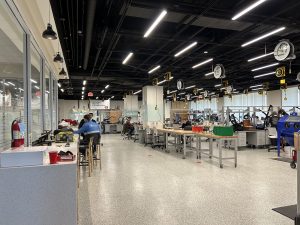
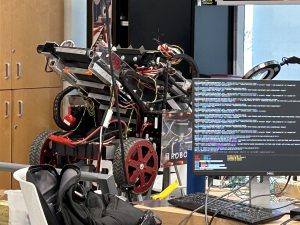
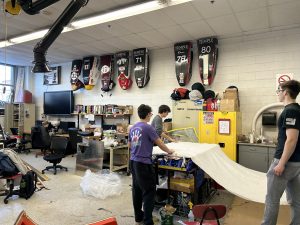
Unlike Drexel students, Temple’s future engineers are more likely to prefer summer internships and devote their attention to classes and research in the fall and spring. Co-op is optional for one or two semesters beginning junior year. The smaller size of the school means that undergraduates have more access to opportunities to work with faculty on research in addition to senior design. They can also study abroad, taking engineering courses at Temple’s campus in Rome.
While Temple has nine engineering majors, it does not offer a degree in Chemical Engineering. However, it does offer programs in Construction Engineering Technology and Engineering Technology, and Mechanical Engineering Technology where Pre-Calculus will be the first required math course. Temple is also trying to attract more students to electrical engineering through its STEPS program that includes scholarships, mentoring and personalized learning opportunities If you begin your education in one of the five majors that starts with Calculus and walk in with some other AP credits, you can earn a master’s degree after five years.
The College of Engineering and the College of Science and Technology have almost a symbiotic relationship.
Unlike some flagship public universities that I have visited, it is common for Temple’s students to switch majors between these two schools. For example, one of my student tour guides switched from Biology to Biomedical Engineering and arranged her schedule so that she could still graduate in four years. The College of Science and Technology hosts the introductory courses in Biology, Chemistry, Mathematics and Physics.
A Temple student could start their education by taking Pre-Calculus and graduate with an engineering degree. However, it will take some careful planning and maybe summer courses to meet math and non-science general education requirements. Temple has no enrollment caps on the majors in either school, which also helps.
Temple University is a good buy for an urban research university, but costly for a public university.
In-state tuition and fees which vary by program and school from $17,000 to just under $22,000, are among the highest in the country for a public school. Non-resident tuition and fees range between $31,000 and $40,,000. Temple offers scholarships to residents and non-residents that help to lower the cost, all the way to full tuition and fees. A mid-pack student at Penn State or Rutgers-New Brunswick might earn a scholarship to Temple. But Temple is not likely to undercut Rutgers for the New Jersey resident.
Temple University has done a great deal to improve curb appeal and user-friendliness on campus.
The Charles Library (picture up top), residences, academic buildings for the business school (below left), engineering and science/technology programs and the student center (below right) are state of the art for a public research university. The campus itself is well lit at dusk and evenings.
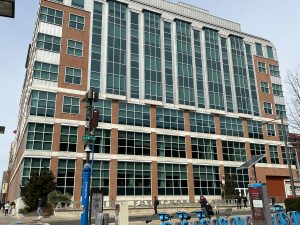
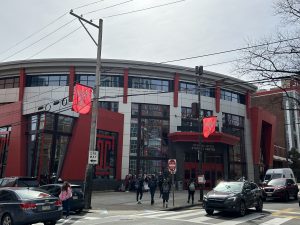
What are other things to like about Temple University?
- Few schools offer stronger connections to a big city business and cultural community, especially in the health care industry.
- Temple has over 110,000 alumni registered in LinkedIn who reside in or near Philadelphia.
- Alumni communities in and around New York City and the Baltimore-Washington Corridor are quite large, too.
- Temple also has interesting study abroad opportunities in Israel, London, Rome and Tokyo, among other places, as well as an opportunity to study away for film and media in Los Angeles.
Temple went test optional in Fall 2015.
There have been some interesting results, according to the Fact Books posted by the university.
- In 2014, the last year under test-mandatory admissions, Temple received just under 27,000 applications. By 2022 there were more than 39,000.
- The number of students who applied test optional rose from just under 6,700 in 2015 to nearly 23,000 in 2021.
- Temple did not admit the majority of students who opted not to submit scores until 2020.
- Freshman retention has declined from 90 percent for the Class of 2019 to 84 percent for the Class of 2025. But some of this can be blamed on the pandemic forcing classes to go online for nearly three semesters .
- Four-year grad rates for the first classes admitted test-optional were higher, reaching 61 percent for the Class of 2020.
Temple is not ultra selective for most programs.
More recently, 78 percent of the students who applied to join the Class of 2026 were accepted. Their average high school GPA was 3.4. Over 30 percent of the recent entering classes have come from outside Pennsylvania, though many still come from the city and neighboring counties.
The university advises students who score at least 1150 to submit scores. However, I advise students who have extraordinarily low scores on one section of the test to apply test optional and early action, especially for the more competitive programs such as the arts, architecture, nursing or pharmacy..
What does it take to Fly in Four?
Temple University has made significant progress in helping its students navigate a large school, thanks in part to an ambitious initiative called Fly In Four. New Owls may sign an agreement upon arriving as freshmen that they will do what they can to make progress towards graduating on time. One caution: it will be tough for a prospective engineer to Fly in Four unless they start their college education with first-semester calculus.
Temple increased its academic advising resources, upgrading technology as well to help students monitor their progress towards their degrees. The university administration also added sections of classes, offered need-based grants and to cover tuition and fees to take required courses in an extra semester. The exceptions: students who chose programs that require more than four years such as Architecture or Pharmacy, failed courses, or made dramatic changes in their major.
Temple has a campus life as well as city life.
Over half of the students live on or immediately near campus though the university is well connected to commuter trains and subways. Temple provides enough housing for the students who ask to live on campus. It’s also easy to find privately owned apartments targeted to the student market within five minutes walking distance, straying no further than Broad Street or the SEPTA commuter rail station. . You might pay over $800/month for rent and utilities to share an apartment. But you will never need a car to get around the city or leave it behind.
There’s a lot of diversity on this campus.
There’s more mingling among students of different ancestries and orientations at Temple than I have seen at Drexel, NYU, Pitt and other flagship state universities I have visited. The school has many clubs and organizations and also has its own “start-up incubator” in the student center. The Blackstone LaunchPad has helped Temple students to start over 900 ventures since 2015, some that blossom into businesses that go off campus. Greek social life is not as popular as it is at a school like Penn State, attracting less than ten percent of the undergraduate student body.
Men’s basketball is the main sports success story.
Temple ranks fifth in wins among all D-1 programs. However, Temple has also enjoyed success in football. Twenty-four former Owls were on NFL rosters last season, including Hassan Reddick who starred for the NFC Champion Philadelphia Eagles. Former Owl and New York Jet Joe Klecko was just elected to the Pro Football Hall of Fame.
There is more to do in Philadelphia than students could possibly find time to do in four years.
The campus is served by SEPTA rail and subway service. Passes are available to students at a discount, and the fare into Center City is only $2.00. Temple students might have tough time getting tickets for Eagles games. But they can get discounts to see the Flyers, Phillies and Sixers.
Since I last visited Temple University hired a new president–who recently resigned.
Dr. Jason Wingard, an executive education professional and former football teammate of U.S. Senator Cory Booker (D. New Jersey) at Stanford University became the first Black president of Temple. Unlike prior presidents, Dr. Wingard, a Philadelphia native, opted to live near campus in a renovated rowhouse.
I found an article written by one of his former Harvard graduate school classmates.She mentions that Dr, Wingard would like to push the curriculum to helps students add skills such as data science, logistics management and digital arts. Another story covers his proposed initiatives for campus safety. The perception of safety around Temple’s campus is not good. Dr. Wingard admitted this in his end of year remarks to the university community,
,Students and trustees were quick to express reactions.
Conclusions
Temple does a lot to help their students to succeed academically and socially and make them competitive for the workforce. But prospective students need to develop a healthy respect for city life as the university and community work to address the safety issues. Temple was gaining positive accolades as pre-pandemic retention and graduation rates improved. This is “Philadelphia’s City University.” So, I hope that Temple’s leadership can right the school’s trajectory.
Report Card: Temple University
- Four-Year/Six-Year Graduation Rates: B/B+
- Freshman Retention: B+
- Costs: B
- Community: B
- Curriculum: A
- Comforts: B
- Connections: A
Want to know more about me?
Buy my new book, The Good College!
Listen to my latest interview on ‘Tests and the Rest’ with Amy Seeley and Mike Bergin!
Listen to my talk, What Exactly Is a Good College? hosted by test-prep experts Amy Seeley and Mike Bergin on Tests And The Rest!
Listen to my talk, College Is A Learning AND Living Community hosted by Dr. Cynthia Colon from Destination YOUniversity on Voice of America Radio!
Sharing is caring!

